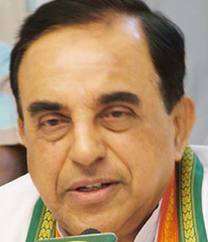![]()
 New Delhi, Aug 12: Subramanian Swamy today announced the merger of his Janata Party with BJP ahead of the 2014 general elections. The announcement was made by Swamy in the presence of BJP president Rajnath Singh, Leader of Opposition in Rajya Sabha Arun Jaitley and former BJP chief Nitin Gadkari. Ahead of the merger, Swamy held discussions with senior BJP leaders at Rajnath Singh's residence, who accepted the merger of his party in BJP and hoped it will make BJP stronger. "Dr Subramanian Swamy is national president of Janata Party and he has decided that the Janata Party and BJP should merge. Today, I accept the merger of Janata Party with BJP. I am confident that with Swamy's joining the BJP and the merger of his party will benefit the BJP...I welcome Dr Swamy in BJP," Singh said after Swamy's decision. Singh said Swamy has been a leader of the Jana Sangh earlier and has accepted that it is the need of the hour in national interest to work together and unite.
New Delhi, Aug 12: Subramanian Swamy today announced the merger of his Janata Party with BJP ahead of the 2014 general elections. The announcement was made by Swamy in the presence of BJP president Rajnath Singh, Leader of Opposition in Rajya Sabha Arun Jaitley and former BJP chief Nitin Gadkari. Ahead of the merger, Swamy held discussions with senior BJP leaders at Rajnath Singh's residence, who accepted the merger of his party in BJP and hoped it will make BJP stronger. "Dr Subramanian Swamy is national president of Janata Party and he has decided that the Janata Party and BJP should merge. Today, I accept the merger of Janata Party with BJP. I am confident that with Swamy's joining the BJP and the merger of his party will benefit the BJP...I welcome Dr Swamy in BJP," Singh said after Swamy's decision. Singh said Swamy has been a leader of the Jana Sangh earlier and has accepted that it is the need of the hour in national interest to work together and unite.
After the merger, Swamy said, "I am very pleased that the President of BJP and the leaders of BJP have welcomed me into BJP as a part of the merger process." He said the country is passing through "very difficult times" and "This is the time for unity, for national and nationalist purpose...I hope to work together and work for the Bharatiya Janata Party along with my colleagues to see that a new future for India can be built in the coming months." Swamy has served as member of the Planning Commission and a former Cabinet Minister at the Centre and has been a five-time MP. Swamy is an ardent proponent of Hindutva philosophy outside the Sangh Parivar and has been active in exposing the 2G Spectrum scam. He recently questioned the Jet-Etihad deal.





Comments
Add new comment